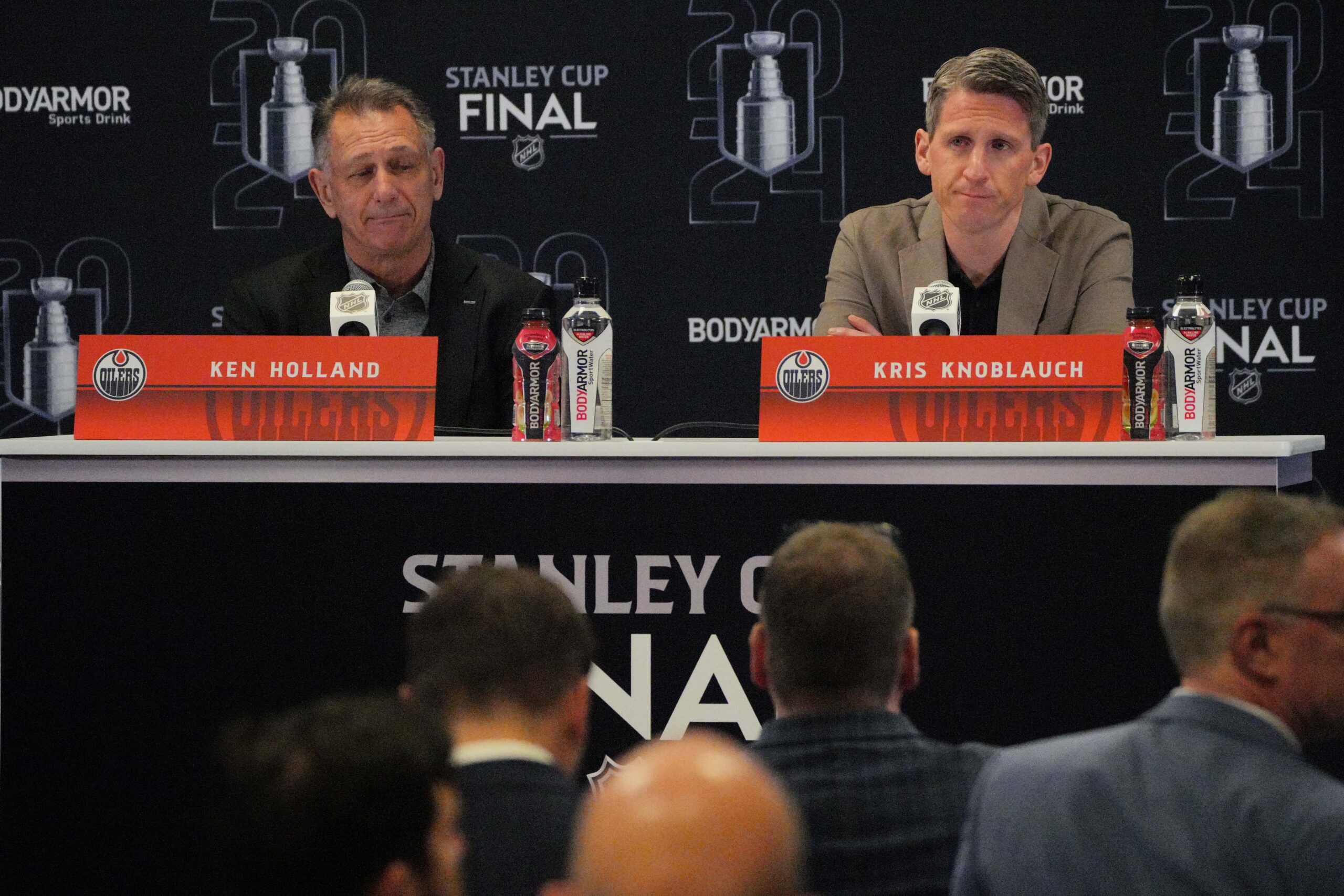To paraphrase Charles Dickens’ A Tale of Two Cities, being in charge of a team with a fan base as passionate as the Edmonton Oilers can be the best of times. Unfortunately, it can also be the worst of times. In a market like Edmonton, moves are scrutinized and parsed through like unknown hieroglyphics in the Da Vinci Code. Therefore, with that in mind, upon announcing he was moving on, here were Ken Holland‘s three best and worst moves as Edmonton Oilers General Manager.
Ken Holland Decides to Move On as Edmonton Oilers GM
Ken Holland served as Oilers GM from 2019 to 2024 before he and the team mutually agreed for him to give up the role. Before that, he had held the same role with the Detroit Red Wings for 22 years, after being handed the torch from Scotty Bowman and Jimmy Devellano. Under Holland’s leadership, the Red Wings won 118 playoff games and secured three Stanley Cup championships, in 1998, 2002, and 2008. The team had made the playoffs in 25 consecutive seasons, a streak that for much of Holland’s tenure.
Things would be different in Edmonton. Holland inherited a non-playoff team that had won just one playoff round in 13 years. In an immediate turnaround, he took them there all five of his years, just missing the Stanley Cup by a single goal in 2023-24. It would have been nice a nice legacy for Holland to go out on top, but one goal short of getting his name on the Stanley Cup again isn’t chopped kielbasa. Having said that, here are Holland’s three best and worst moves in his five years with the Oilers.
The Best of Times: Acquiring Mattias Ekholm, Zach Hyman, and Kris Knoblauch
Mattias Ekholm came to the Oilers in a surprise deadline trade with the Nashville Predators in 2023. Prior to his arrival, the team performed well offensively, but had trouble keeping the puck out of their own net. Ekholm had an immediate impact. In the last 18 games of the season after his acquisition, the team went 14-0-4.
Stabilizing the Offence with Defence and Mentoring a Young Blueline
Ekholm had finally given the Oilers a defensive identity. But that didn’t mean offence was sacrificed. Not the team’s. Not even his own. The next year, 2023-24, all while stabilizing the team defensively, the 34-year-old defenceman had an NHL career-high 45 points (11 goals, 34 assists) in 79 games in the regular season and ten points (five goals, five assists) in 25 playoff games.
Another area where Ekholm’s acquisition was crucial was in Evan Bouchard’s emergence. Prior to the trade for Ekholm, the Oilers power play was run by the departing Tyson Barrie. Barrie had the best PP points total in the league for defencemen. Not to worry. This opened up a spot for the blocked Bouchard. All he did was blow Barrie’s totals out of the water. More importantly, Bouchard was paired with Ekholm on the team’s top pairing. Under Ekholm’s tutelage, Bouchard learned how to balance and develop a more complete game. Until his pairing with Ekholm, Bouchard was criticized for his lack of intensity, his defensive coverage, and fans were actively calling for him to be traded. Suddenly, paired with Ekholm, he had quickly developed into a Norris Trophy candidate. As Oilers CEO of hockey operations Jeff Jackson put it
“The Mattias Ekholm trade with (the) Nashville [Predators] at the (NHL Trade) deadline a year ago (on Feb. 28, 2023) can be another thing that is looked at as it changed the trajectory of a lot of things,” Jackson said. “‘Ekky’ brings so much to leadership, compete, mentoring; it allowed the team last year and this year to elevate ‘Bouch’ [defenseman Evan Bouchard] and he responded, they’re a great pair.”
Bringing in Productivity, Intensity, and Grit: Zach Hyman
Zach Hyman made the leap from a complementary player to a scoring ace. Signing Hyman as a free agent in 2021 has been called the best free agent signing in a decade. Already a good player with the Toronto Maple Leafs, Hyman became a great one in Edmonton. From a previous career-best 21 goals, and 41 points, he went to 54 and 83, respectively.
“Shaq” Hyman is the Oilers Own Version of “Gritty.” At a very reasonable $5.5 million AAV contract hit, Hyman was soon the finisher on Connor McDavid’s wing on the top line. As far back as his early days with the Leafs, Hyman was being nicknamed “Shaq” for the overwhelming number of goals he scores close to the blue paint of the crease. Just like his namesake, NBA legend Shaquille O’Neal. Hyman’s versatility and consistency helped bolster the Oilers top-six forward group. Few in the league are as strong on the puck or along the boards as Hyman, at both ends of the rink. He brings grit, scoring ability, and a relentless work ethic to the Oilers. His contributions are far greater than simply his scoring totals.
The Modern-Day Scotty Bowman: Kris Knoblauch
For Knoblauch, like Bowman, all he has done is win. The Oilers started their 2023-24 season with a 3-9-1 record. It was the worst ever record for the Oilers through the first 13 games of a season. This from a team that claimed before the season that it was “Cup or bust.” Something had to give. Now former Head Coach Jay Woodcroft was let go. Knoblauch was brought in. All the team under Knoblauch did was finish the season with a 69 game, 46-18-0-5 record. Shortly after his arrival, the team went on a 16 game winning streak, just missing the Pittsburgh Penguins NHL record of 17. He is the first ever head coach in league history to have two seven-game winning streaks in their first 25 games in charge.
Paging Scotty Bowman
But it was in the playoffs that Knoblauch truly earned his Bowman stripes. First, he gave inexperienced players Dylan Holloway and Phillip Broberg major roles that they both succeeded in. Second, he replaced faltering Stuart Skinner with backup Calvin Pickard for two games in their second-round playoff series against the Vancouver Canucks. This would turn the series around. Third, he formed the most effective third-line combination (Mattias Janmark–Adam Henrique–Connor Brown) of the entire playoffs. Next, he masterfully moved players like Warren Foegele, Corey Perry, Derek Ryan, Sam Carrick, and Ryan McLeod in and out of the lineup at exactly the right times. Finally, he had the guts to sit Evander Kane when injury made him more of a liability than an asset. Without Knoblauch, there would have been no 2024 Stanley Cup final for the Oilers. There might not even have been a playoff berth.
The Worst of Times: Three Big “Oops”
You can understand Holland’s reasoning bringing in Keith in a 2021 trade. The future Hall of Famer would be an ideal partner to mentor rising defenceman Evan Bouchard as he learned the NHL game. The problem wasn’t bringing in Keith. Instead, it was bringing in the contract that came with him. And what he gave back.
Bringing in Leadership and Experience: Duncan Keith
Keith came with a $5.54 million cap hit for two seasons. The Chicago Blackhawks were in rebuild mode and eager to move him. A fair deal would have seen the Blackhawks retaining a significant portion of Keith’s salary. Instead, they retained none. The Oilers were already suffering salary cap problems. This strained it further. In addition, despite Keith’s experience and pedigree, Keith was 38. His play was declining. He struggled with speed and defensive coverage. Finally, Holland gave up a very serviceable defenceman, Caleb Jones, and a conditional draft pick to get Keith. All of it was too high a price for an aging player.
Mortgaging the Future for a Short-Term Rental: Andreas Athanasiou
Gearing up for the 2019-20 playoffs, Holland brought in Athanasiou from his old team, the Detroit Red Wings. The idea was to bring in some support scoring for Connor McDavid and Leon Draisaitl. It didn’t work out. Athanasiou only played nine games for the Oilers, getting a paltry single goal and assist. He had zero points in the playoffs. For this, echoing previous GM Peter Chiarelli’s disastrous 2015 trade giving up first-round (Mathew Barzal) and second-round (Mitchell Stephens) draft picks for Griffin Reinhart, Holland gave up Sam Gagner, a round two pick in the 2020 NHL draft (Brock Faber) and a round two pick in the 2021 NHL draft (Aatu Raty) to the Red Wings.
And then came Covid and a freeze in the league salary cap. With the expected increased cap space gone, Holland couldn’t afford to give Athanasiou a qualifying offer and he left for the Los Angeles Kings. At least Athanasiou scored more points as an Oiler than Reinhart did (one assist) in his entire Oiler career. But the emptying of the pipeline bringing in young players to Edmonton was disastrous in both cases. None of the other Detroit players (Mike Green, Riley Sheahan) Holland brought in panned out either.
The Best Worst-Choice in Goal: Jack Campbell
The Oilers goaltending had been shaky for a few years under Mike Smith and Mikko Koskinen. Yes, the promising Stuart Skinner was on his way. But then, at the end of the 2021-22 season, both Smith and Koskinen left the team, leaving a huge void. It would be grossly unfair to put the entire load on the 24-year-old Skinner’s shoulders. At the time, he had only 14 games of NHL experience under his belt. The idea was to develop him as a backup behind an experienced hand until he seasoned.
Enter Campbell. Campbell was signed to a five-year, $25 million contract, which carried significant risk given his inconsistent performance history with the Toronto Maple Leafs and Los Angeles Kings. There were concerns about his durability, mental makeup, history of injuries, and the length of the contract.
To be fair, there weren’t a lot of good goalie options out on the market that summer. Okay, none. Campbell was the best, worst choice available. The fears were warranted. Campbell never found his footing in Edmonton.
He played 36 games in 2022-23, hardly first string numbers. He won only 21 of them. Worse still, he had a 3.41 GAA and .888 SV%. Campbell was brought in to carry the load while Skinner developed. Conversely, it was Skinner that saved the Oilers’ season. The next season, 2023-24, was even worse. Campbell played but five games, with a 4.50 GAA and .873 SV% before being sent to the minors permanently. The net was now Skinner’s permanently. Not only was Campbell’s play subpar, his contract added a significant cap hit, limiting the Oilers’ ability to address other roster needs effectively. Then, this summer, the Oilers bought out his contract, putting themselves on the hook for $10.5 million in dead cap space over six years.
Honourable Mention: Lightning only Strikes Once
Unlike with Zach Hyman’s great free agent signing, Edmonton’s other signing didn’t turn out too well when Holland gave Zack Kassian a four-year contract worth $12.8 million in 2020. The term was too long, and the money far too much for a role player. Kassian’s play was inconsistent, and he couldn’t maintain the high level of physicality that had earned him the contract. He was sometimes out of the lineup with suspensions. Similar players providing better value and more flexibility under the salary cap could have been found for less money.
More Hits than Misses
Overall, Holland’s hits outweighed his misses. He brought an underperforming perennial non-playoff team to the playoffs every one of his five years. The team came within one goal of winning the Stanley Cup this year. You can’t argue with success like that. Even if you don’t like chopped kielbasa. The question remaining is if Holland, like Dickens, has more chapters in him or he goes out almost on top and retires.
Main photo: Jim Rassol-USA TODAY Sports






